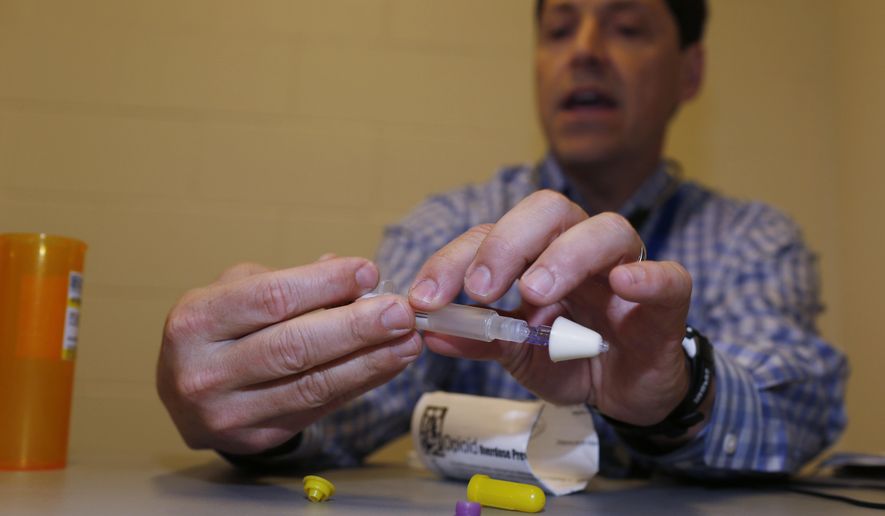Citing the deadly opioid crisis, Baltimore officials made it easier on Thursday to acquire an overdose-reversing drug over the counter, saying the antidote should be as prevalent as possible to prevent more deaths.
City Health Commissioner Leana Wen waived training requirements for acquiring and using naloxone, a fast-acting medication that’s become a vital and ubiquitous tool in fighting the nation’s heroin and prescription painkiller crisis.
Dr. Wen said the training only took a few minutes — naloxone can be administered as a nasal spray or injected into the muscle, like an EpiPen. But the associated paperwork was cumbersome, so she implemented a recent state law allowing her to scrap the training altogether.
“Any resident can go into any of our pharmacies in Baltimore City and immediately get the medication for saving someone’s life,” she said.
City residents on Medicaid can acquire two doses of naloxone for $1 — it’s free if they don’t have the money — while those on private insurance typically face co-pays of $10 to $40.
Baltimore estimates that 20,000 residents use heroin and thousands more abuse prescription opioids. There were 481 fatal overdoses in the city during the first nine months of 2016, according to preliminary data, and deaths related to fentanyl have risen twentyfold in recent years, the health department said.
The order brings Baltimore in line with a number of states that have granted over-the-counter access to the drug without training requirements, though who may acquire it varies from state to state. It also coincides with efforts at every level of government to respond to a devastating opioid epidemic that is killing more Americans than car crashes do in some places.
Earlier this week, the Department of Health and Human Services announced $70 million in state grants to expand medication-assisted treatment for opioid addiction and expand the use of overdose-reversing drugs.
Ohio, meanwhile, became the latest jurisdiction to take a hard line on opioid manufacturers, filing a lawsuit that said their marketing practices disregarded the risks of addiction and fueled the state’s epidemic as patients, once hooked, turned to cheaper alternatives such as heroin and synthetic opioids.
The defendant companies either declined to comment or said the litigation was misguided, saying they’ve complied with federal rules and have developed forms of their drugs that are less susceptible to abuse but still manage pain.
The state of Mississippi, city of Chicago and counties in New York, California and West Virginia have filed similar lawsuits against companies along the prescription opioid supply chain.
Congress last year tried to get its arms around the opioid crisis by approving $500 million each for fiscal years 2017 and 2018 to deliver much-needed treatment and expand the use of drugs such as naloxone, which is also known by the brand name Narcan.
Some critics say naloxone is a backstop that emboldens addicts to take risks and continue using.
Maine Gov. Paul LePage vetoed a 2016 bill that would have allow pharmacists to distribute naloxone without a prescription to those at risk of an overdose. At the time, he said the drug “does not truly save lives; it merely extends them until the next overdose.”
Dr. Wen, meanwhile, said the benefits are clear, and she is encouraging as many people as possible to carry it.
“There are those who continue to stigmatize the disease of addiction. It comes with a lack of understanding,” she said. “You would never say to someone, ’I’m not going to give you an EpiPen because you have an allergy.’”
Naloxone is technically not an over-the-counter drug — that classification is up to the FDA — though various states and jurisdictions have issued standing orders to make it easier to get.
In October 2015 Baltimore become the first jurisdiction in Maryland to issue such an order, effectively making Dr. Wen the prescriber for the city’s 620,000 residents.
City officials say that since 2015, more than 23,000 city residents have been trained to use naloxone, resulting in more than 800 lives saved.
• Tom Howell Jr. can be reached at thowell@washingtontimes.com.




Please read our comment policy before commenting.